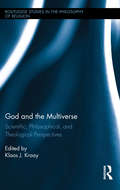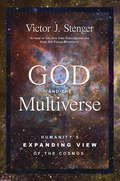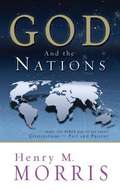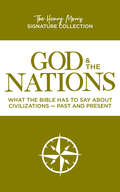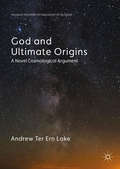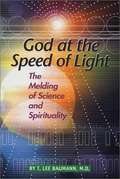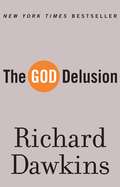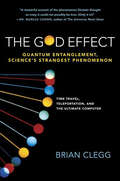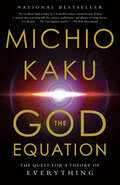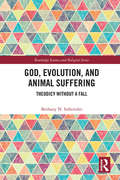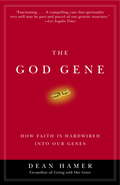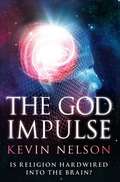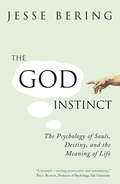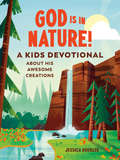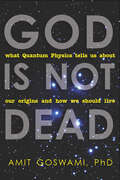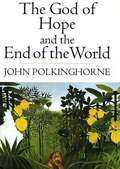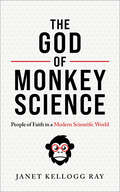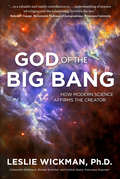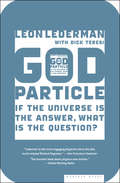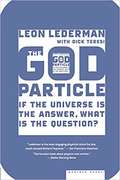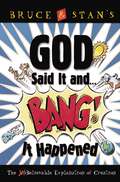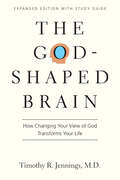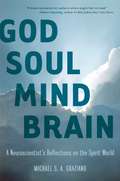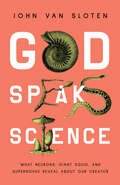- Table View
- List View
God and the Multiverse: Scientific, Philosophical, and Theological Perspectives (Routledge Studies in the Philosophy of Religion)
by Klaas KraayIn recent decades, scientific theories have postulated the existence of many universes beyond our own. The details and implications of these theories are hotly contested. Some philosophers argue that these scientific models count against the existence of God. Others, however, argue that if God exists, a multiverse is precisely what we should expect to find. Moreover, these philosophers claim that the idea of a divinely created multiverse can help believers in God respond to certain arguments for atheism. These proposals are, of course, also extremely controversial. This volume collects together twelve newly published essays – two by physicists, and ten by philosophers – that discuss various aspects of this issue. Some of the essays support the idea of a divinely created multiverse; others oppose it. Scientific, philosophical, and theological issues are considered.
God and the Multiverse
by Victor J. StengerCosmologists have reasons to believe that the vast universe in which we live is just one of an endless number of other universes within a multiverse--a mind-boggling array that may extend indefinitely in space and endlessly in both the past and the future. Victor Stenger reviews the key developments in the history of science that led to the current consensus view of astrophysicists, taking pains to explain essential concepts and discoveries in accessible terminology. The author shows that science's emerging understanding of the multiverse--consisting of trillions upon trillions of galaxies--is fully explicable in naturalistic terms with no need for supernatural forces to explain its origin or ongoing existence. How can conceptions of God, traditional or otherwise, be squared with this new worldview? The author shows how long-held beliefs will need to undergo major revision or otherwise face eventual extinction.From the Hardcover edition.
God and the Nations
by Dr Henry M. MorrisBehold, the nations are as a drop of a bucket, and are counted as the small dust of the balance...Isaiah 40:15 A fascinating title from creationist icon Henry Morris Perfect for Christians who focus on apologetics Focuses on a rare, but important topic: God's plan for individual countries In the Bible, we see the interest God has in humans and their cultures. In the Old and New Testaments, the Hebrew and Greek words for "nations" occurs 720 times. Many of the nations that were given land and resources during Bible times have now passed into history, such as the Assyrians, Babylonians, and Hittites. We also know from secular history that civilizations like the Aztecs and Greeks are also largely removed from the scene. All this is due to those nations rejection of God's laws. Indeed, of the 200 nations in existence today, only a handful actively seek God.
God and the Nations: What the Bible has to say about Civilizations - Past and Present (The Henry Morris Signature Collection)
by Henry MorrisDespite living in a very connected world today, few of us have any real understanding of the history of nations. Secular scholars and scientists from various fields rarely consult the Bible’s rich history on the subject. Yet if we consider what the Bible has to say about the global community’s past—and future—achievements and mistakes, we discover a saga as fascinating as anything produced in Hollywood. In God & the Nations, Dr. Henry Morris does an unusual thing: he shows clearly that God is even more interested in the fate of each person as He is about the unfolding of national stories. Additionally, he delves into the mysterious world of Bible prophecy to proclaim the God of the Bible as truly unique. Morris, through this study of civilizations, reveals the origins and purpose for the whole world!
God and Ultimate Origins: A Novel Cosmological Argument (Palgrave Frontiers in Philosophy of Religion)
by Andrew Ter Ern LokeThis book develops a novel argument which combines the Kalam with the Thomistic Cosmological Argument. It approaches an ongoing dispute concerning whether there is a First Cause of time from a radically new point of view, namely by demonstrating that there is such a First Cause without requiring the controversial arguments against concrete infinities and against traversing an actual infinite (although the book presents original defenses of these arguments as well). This book also develops a novel philosophical argument for the Causal Principle, namely that 'everything that begins to exist has a cause', and offers a detailed discussion on whether a First Cause of time can be avoided by a causal loop. It also addresses epistemological issues related to the Cosmological Argument which have been relatively neglected by recent publications, and demonstrates (contra Hawking et al) the continual relevance and significance of philosophy for answering ultimate questions.
God at the Speed of Light: The Melding of Science and Spirituality
by T. Lee BaumannTo whichever end of the spectrum our beliefs gravitate--that of spirituality or that of science--the universe is an astonishing and mysterious place. But what if the ends of the spectrum are moving closer together? What if our increasing knowledge in both science and spirituality is pointing us all in the same direction? Physician Lee Baumann examines the premise--that spirituality and quantum physics are, in fact, two sides of the same coin: the presence of a guiding intelligence in the universe, the presence of God.
The God Delusion
by Richard DawkinsA preeminent scientist -- and the world's most prominent atheist -- asserts the irrationality of belief in God and the grievous harm religion has inflicted on society, from the Crusades to 9/11.With rigor and wit, Dawkins examines God in all his forms, from the sex-obsessed tyrant of the Old Testament to the more benign (but still illogical) Celestial Watchmaker favored by some Enlightenment thinkers. He eviscerates the major arguments for religion and demonstrates the supreme improbability of a supreme being. He shows how religion fuels war, foments bigotry, and abuses children, buttressing his points with historical and contemporary evidence. The God Delusion makes a compelling case that belief in God is not just wrong but potentially deadly. It also offers exhilarating insight into the advantages of atheism to the individual and society, not the least of which is a clearer, truer appreciation of the universe's wonders than any faith could ever muster.
The God Effect: Quantum Entanglement, Science's Strangest Phenomenon
by Brian CleggThe phenomenon that Einstein thought too spooky and strange to be trueWhat is entanglement? It's a connection between quantum particles, the building blocks of the universe. Once two particles are entangled, a change to one of them is reflected---instantly---in the other, be they in the same lab or light-years apart. So counterintuitive is this phenomenon and its implications that Einstein himself called it "spooky" and thought that it would lead to the downfall of quantum theory. Yet scientists have since discovered that quantum entanglement, the "God Effect," was one of Einstein's few---and perhaps one of his greatest---mistakes.What does it mean? The possibilities offered by a fuller understanding of the nature of entanglement read like something out of science fiction: communications devices that could span the stars, codes that cannot be broken, computers that dwarf today's machines in speed and power, teleportation, and more. In The God Effect, veteran science writer Brian Clegg has written an exceptionally readable and fascinating (and equation-free) account of entanglement, its history, and its application. Fans of Brian Greene and Amir Aczel and those interested in the marvelous possibilities coming down the quantum road will find much to marvel, illuminate, and delight.
The God Equation: The Quest for a Theory of Everything
by Michio Kaku#1 NEW YORK TIMES BESTSELLER • The epic story of the greatest quest in all of science—the holy grail of physics that would explain the creation of the universe—from renowned theoretical physicist and author of The Future of the Mind and The Future of Humanity.When Newton discovered the law of gravity, he unified the rules governing the heavens and the Earth. Since then, physicists have been placing new forces into ever-grander theories. But perhaps the ultimate challenge is achieving a monumental synthesis of the two remaining theories—relativity and the quantum theory. This would be the crowning achievement of science, a profound merging of all the forces of nature into one beautiful, magnificent equation to unlock the deepest mysteries in science: What happened before the Big Bang? What lies on the other side of a black hole? Are there other universes and dimensions? Is time travel possible? Why are we here? Kaku also explains the intense controversy swirling around this theory, with Nobel laureates taking opposite sides on this vital question. It is a captivating, gripping story; what&’s at stake is nothing less than our conception of the universe. Written with Kaku&’s trademark enthusiasm and clarity, this epic and engaging journey is the story of The God Equation.
God, Evolution, and Animal Suffering: Theodicy without a Fall (Routledge Science and Religion Series)
by Bethany N. SollerederAfter the publication of On the Origin of Species in 1859, theologians were faced with the dilemma of God creating through evolution. Suddenly, pain, suffering, untimely death and extinction appeared to be the very tools of creation, and not a result of the sin of humanity. Despite this paradigm shift, the question of non-human suffering has been largely overlooked within theodicy debates, overwhelmed by the extreme human suffering of the twentieth century. This book redresses this imbalance by offering a rigorous academic treatment of the questions surrounding God and the suffering of non-human animals. Combining theological, philosophical, and biblical perspectives, this book explores the relationship between God and Creation within Christian theology. First it dismantles the popular theological view that roots violence and suffering in the animal kingdom in the fall of humanity. Then, through an exploration of the nature of love, it affirms that there are multiple reasons to suggest that God and creation can both be "good", even with the presence of violence and suffering. This is an innovative exploration of an under-examined subject that encompasses issues of theology, science, morality and human-animal interactions. As such, it will be of keen interest to scholars and academics of religion and science, the philosophy of religion, theodicy, and biblical studies.
The God Gene
by Dean HamerLEADING GENETICIST DEAN HAMER CRACKS THE "CODE" BEHIND WHY WE ARE PREDISPOSED TO BELIEVE IN GOD. IN A BOOK THAT BRIDGES THE GAP BETWEEN RELIGION AND SCIENCE," HAMER BRILLIANTLY ILLUMINATES HOW OUR INCLINATION TOWARD FAITH IS INFLUENCED BY OUR GENES. The overwhelming majority of Americans believe in God, expressing a conviction that has existed since the beginning of recorded time and is shared by billions around the world. In "The God Gene, Dr. Dean Hamer reveals that this inclination toward religious faith is no accident; it is in good measure due to our genes. In fact, he argues, spiritual belief may offer an evolutionary advantage by providing humans with a sense of purpose and the courage and will to overcome hardship and loss. And, as a growing body of evidence suggests, belief also increases our chances of reproductive survival by helping to reduce stress, prevent disease, and extend life. Hamer shows that new discoveries in behavioral genetics and neurobiology indicate that humans inherit a set of predispositions that make their brains ready and eager to embrace a higher power. By analyzing the genetic makeup of over a thousand people of different ages and backgrounds, and comparing their DNA samples against a scale that measures spirituality, Hamer actually identified a specific "God gene" that appears to influence spirituality. Popular science at its best, "The God Gene is an in-depth, fully accessible inquiry into the cutting-edge research that is changing the way we think about ourselves, our world, and our culture. Written with balance and integrity, without seeking to confirm or deny the existence of God, "The God Gene brilliantly illuminates the mechanismby which belief itself is biologically fostered. It's a book that bridges the gap between science and religion, and one that will appeal to the readers of Genesis and "Genome alike.
The God Impulse: Is Religion Hardwired into the Brain?
by Kevin NelsonWhy do people have near-death experiences? Are there physical explanations for those out-of-body sensations and tunnels of light? And what about moments of spiritual ecstasy? If Buddha had been in an MRI machine and not under the Bodhi tree when he attained enlightenment, what would we have seen on the monitor? In THE GOD IMPULSE, Kevin Nelson, a neurologist with three decades' experience examining the biology behind human spirituality, deconstructs the spiritual self, uncovering its origin in the most primitive areas of our brain. Through his revolutionary studies on near-death experience, Nelson has discovered that spiritual experience is an incidental product of several different neurological processes acting independently. When we feel close to God or sense the presence of departed relatives, we may believe that we are standing at the border of this world and the next as individual, autonomous, rational creatures--touching God. The reality is far different: our brain function resembles a Cubist painting by Picasso or Braque, and the experiences we regard as the height of our humanity are in fact produced by primal reflexes. THE GOD IMPULSE takes us on a journey into what Nelson calls the borderlands of consciousness. The book offers the first comprehensive, empirically-tested, peer-reviewed examination of the reasons we are capable of near-death experience, out-of-body experience, and the mystical states produced by hallucinogenic drugs.
The God Instinct: The Psychology of Souls, Destiny and the Meaning of Life
by Jesse BeringThe God Instinct explores how people's everyday thoughts, behaviours and emotions betray an innate tendency to reason as though God were deeply invested in their public lives and secret affairs.In this entertaining and thought-provoking book, Jesse Bering unravels the evolutionary mystery of why we grapple for meaning, purpose and destiny in life. He argues that God is not merely an idea to be entertained or discarded based on the evidence. Nor is God a cultural invention, an existential band-aid, an opiate of the masses. Instead, Bering proposes, God is a way of thinking - one that evolved through our ancestors, millions of years ago, to keep us in check and give us the edge on our competitors.While a belief in higher forces may seem ridiculous to some, The God Instinct shows that it is hardwired into our genetic make-up, and carries with it massive evolutionary benefits.
God Is in Nature!: A Kids Devotional About His Awesome Creations
by Jessica DoeblerThe only kids nature devotional featuring Scripture, Bible studies, and prayers that collectively teach children to praise God by appreciating nature and His awesome creations In this exciting and inspiring kids devotional, children will learn firsthand about God&’s fascinating world and amazing creations. From reading God&’s words in the Bible to getting outside and being captivated by the highest mountain and the tiniest fish, kids ages 6−10 will connect with God in fun and engaging ways. The Bible tells us about the story of creation and the amazing things that God can do. From rainbows and waterfalls to deserts and a starry night, God&’s miracles surround us, and they are undoubtedly awesome and cool. •100 kids devotions, organized by locale—accessible places like fields and parks; rivers, oceans, and lakes; and forests and mountains—offer opportunities for immediate exploration.•Prayers help kids slow down and appreciate what&’s in front of them.•Stunning illustrations capture a glimpse of the beauty and wonder that awaits the reader outside and creates the perfect gift package for those looking for a beautiful and meaningful Christian book for kids.•Less screen time with activity tips that encourage kids to get outside and see nature.
God Is Not Dead: What Quantum Physics Tells Us About Our Origins and How We Should Live
by Amit GoswamiA “pioneering” physicist “shows how quantum reasoning may resolve deep mysteries, including the nature of God [and] evolution” (Beverly Rubik, PhD, Biophysicist, Institute for Frontier Science, Adjunct Professor, Saybrook).Move over, Richard Dawkins and Christopher Hitchens—a highly regarded nuclear physicist enters the debate about the existence of God—and comes down on the side of the angels. Goswami’s hypothesis is that quantum physics holds the key to all the unsolved mysteries of biology—the nature and origin of life, fossil gaps of evolution, why evolution proceeds from simple to complex, and why biological beings have feeling and consciousness.In God is Not Dead, Goswami moves beyond theory and shows how a God-based science puts ethics and values where it belongs: at the center of our lives and societies. He provides a scientific model that steers between scientific materialism and religious fundamentalism; a model that has implications for how we live both individually and collectively.God is Not Dead is a fascinating tour of quantum physics, consciousness, and the existence and experience of God.
The God of Hope and the End of the World
by John PolkinghorneIn this engaging book, a leading scientist-theologian draws on ideas from science, scripture, and theology to address the question of hope and disillusionment found in the bible and other sources.
The God of Monkey Science: People of Faith in a Modern Scientific World
by Janet Kellogg RayHow to hold true to your faith and embrace modern scienceEver since the Scopes Monkey Trial in the early twentieth century, American evangelicals have considered scientists public enemy #1. But this antipathy to modern science turned deadly during the COVID-19 crisis, when white evangelicals snubbed precautions and vaccines. Herself an evangelical Christian and a science educator, Janet Kellogg Ray explains how we got here and how to fix it.As the follow-up to Baby Dinosaurs on the Ark?, this lively volume covers evolution as well as the coronavirus pandemic, vaccines, climate change, and the frontiers of genetic research. Ray explains the facts accessibly and with verve. Along the way, she vividly narrates the scientific achievements—and political and religious drama—that got us to where we are today.Ultimately, Ray calls for evangelicals to speak to science, rather than deny it. We need Christian ethics now more than ever to determine how best to act in light of current scientific data and for love of neighbor. If you&’re afraid of science hurting your faith, this book will show you how to be true to both.
God of the Big Bang: How Modern Science Affirms the Creator
by PhD Leslie WickmanPh.D. expert in astronautical and aeronautical engineering provides good news for believers - new scientific research supports the idea that the universe was created by God.
The God Part of the Brain: A Scientific Interpretation of Human Spirituality and God
by Matthew AlperAre human beings hard-wired to believe in God? If so, what would the consequences be and how would such hard-wiring impact mankind's belief in eternal life, morality, and a sovereign God?
God Particle: If the Universe Is the Answer, What Is the Question?
by Leon Lederman Dick TeresiA Nobel Prize–winning physicist&’s &“funny, clever, entertaining&” account of the history of particle physics and the hunt for a Higgs boson (Library Journal). In this extraordinarily accessible and witty book, Leon Lederman—&“the most engaging physicist since the late, much-missed Richard Feynman&” (San Francisco Examiner)—offers a fascinating tour that takes us from the Greeks&’ earliest scientific observations through Einstein and beyond in an inspiring celebration of human curiosity. It ends with the quest for the Higgs boson, nicknamed the God Particle, which scientists hypothesize will help unlock the last secrets of the subatomic universe. This is not only an enlightening journey through baryons and hadrons and leptons and electrons—it also &“may be the funniest book about physics ever written&” (The Dallas Morning News). &“One of the clearest, most enjoyable new science books in years . . . explains the entire history of physics and cosmology. En route, you&’ll laugh so hard you won&’t realize how much you are learning.&” —San Francisco Examiner &“The story of the search for the ultimate constituents of matter has been told many times before, but never with more verve and wit. . . . His hilarious account of how he helped persuade President Reagan to approve the construction of the Super Collider is itself worth the price of the book.&” —Los Angeles Times
The God Particle: If the Universe Is the Answer, What Is the Question?
by Leon Lederman with Dick TeresiDid you know that the most creative companies have centralized bathrooms? That brainstorming meetings are a terrible idea? That the color blue can help you double your creative output? From the New York Times best-selling author of How We Decide comes a sparkling and revelatory look at the new science of creativity. Shattering the myth of muses, higher powers, even creative "types," Jonah Lehrer demonstrates that creativity is not a single gift possessed by the lucky few. It's a variety of distinct thought processes that we can all learn to use more effectively. Lehrer reveals the importance of embracing the rut, thinking like a child, daydreaming productively, and adopting an outsider's perspective (travel helps). He unveils the optimal mix of old and new partners in any creative collaboration, and explains why criticism is essential to the process. Then he zooms out to show how we can make our neighborhoods more vibrant, our companies more productive, and our schools more effective.You'll learn about Bob Dylan's writing habits and the drug addictions of poets. You'll meet a Manhattan bartender who thinks like a chemist, and an autistic surfer who invented an entirely new surfing move. You'll see why Elizabethan England experienced a creative explosion, and how Pixar's office space is designed to spark the next big leap in animation. Collapsing the layers separating the neuron from the finished symphony, Imagine reveals the deep inventiveness of the human mind, and its essential role in our increasingly complex world.
God Said It and Bang! It Happened: The UnBelievable Explanation of Creation
by Bruce Bickel Stan JantzIn this fun and entertaining look at the world and how we came to be, authors Stan Jantz and Bruce Bickel will answer the basic questions about life: Where did I come from? And why am I here? Filled with humor, this creative book is illustraed wiith line drawings from somewhat-crazy-himself autho/illustrator Bill Ross (Hey, That's Not What The Bible Says!) and includes chapters such as:Why Begin at the Beginning? What's the Big Deal about God? Long, Long Ago in a Galaxy Far Away Earth Wind and Fire The Matrix What if God was One of Us?I Want to Live Forever If Creation is True Why Isn't It in School?
The God-Shaped Brain: How Changing Your View of God Transforms Your Life
by Timothy R. JenningsWhat you believe about God actually changes your brain. Brain research in neuroscience has found that our thoughts and beliefs affect our physical, mental, and spiritual health. Mind and body are interrelated, and we are designed for healthy relationships of love and trust. When we understand God as good and loving, we flourish. Unfortunately, many of us have distorted images of God and mostly think of him in fearful, punitive ways. This leads us into unhealthy patterns of self-defeating behaviors and toxic relationships. But our lives can change when God renews our minds with a truer picture of him. Psychiatrist Tim Jennings unveils how our brains and bodies thrive when we have a healthy understanding of who God is. He dispels common misconceptions about God and shows how different God concepts affect the brain differently. Our brains can adapt, change, and rewire with redeemed thinking that frees us from unnecessary pain and suffering. Discover how neuroscience and Scripture come together to bring healing and transformation to our lives. This expanded edition now includes a study guide for individual reflection or group discussion, with questions for learning from Scripture, science and nature, and experience.
God Soul Mind Brain
by Michael S. Graziano"Essential reading for the devout, the agnostic, and the atheist. In tackling the question of the religious brain, Graziano is respectful, sincere, and scientifically plausible. This might even be an Important Book."-Sam Wang, author of Welcome to Your Brain"A beautifully crafted, tightly scripted account of how the far-flung legions of the brain's neurons give rise to social awareness and our notions of soul, religion and God."-Christof Koch, author of The Quest for Consciousness"Lucid and engaging. . . . Moves with pace and humor."-Philip Johnson-Laird, author of Mental Models"Do we know the origins of Gods and ghosts? This well-written book makes the bold case that new discoveries in social neuroscience can illuminate human spiritual experience."-Terry Sejnowski, PhD, Salk Institute/UC San DiegoWriting for the general public, Michael S. A. Graziano explores the controversial relationship between science and religion, first dismissing the "science versus religion" debate as outdated. The cutting-edge field of social neuroscience explains how our perceptions of our own consciousness, of other minds, and of spirits and gods depend on machinery in the brain that evolved to make us socially intelligent animals. In clear prose without technical jargon, Graziano discusses his and others' findings in this twenty-year-old science and the implications for human spirituality and religion.Michael S. A. Graziano, professor of neuroscience, Princeton University, is the author of numerous articles on the functioning of the brain. He is internationally known for fundamental discoveries about sensory-motor coordination. His previous book on the brain, The Intelligent Movement Machine, was published by Oxford University Press in 2008.
God Speaks Science: What Neurons, Giant Squid, and Supernovae Reveal About Our Creator
by John Van SlotenA joy-filled expedition into experiencing God&’s majestic, everywhere presence.DNA, the Danube River, and deep-sea life. Knees and trees. The Swiss Alps, songbirds, and supernovas. God speaks though His creation. And you don&’t have to be naturally gifted at biology, chemistry, or physics to be awakened to His wisdom and majesty. Pastor, teacher, and non-scientist John Van Sloten invites us to know God more deeply as we marvel at the complexities of His amazing creation.Knowing God through His written Word enables us to know Him more clearly through His creational Words. How does God speak through His creation, and what is He saying? Each chapter includes interviews with leading scientists and connects creation to its Creator. With the primary foundation that Jesus is the mediator of both salvation and creation, Van Sloten fields questions such as:Why are things beautiful and how can beautiful things be engaged?How does the doctrine of the Trinity teach us about the nature of tree branches and wound healing?What do the doctrines of creation, incarnation, and the resurrection tell us about phenomenon of supernovas?How do we engage God&’s providence through knees and fossils?We were made to wonder. To marvel. To know and live in awe of God. God Speaks Science expands our hearts and minds so that we might delight in the wisdom, beauty, and awesome power of our triune God!
